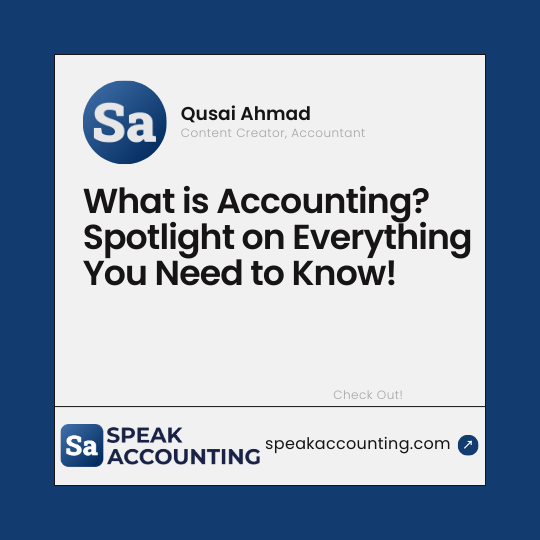
Introduction
Understanding what is accounting can be like learning the steps to a dance. Whether you’re starting a side business or just managing your money carefully, accounting helps you keep track of your finances. So, let’s break it down simply and learn the basics of accounting.
1. The Power of Financial Literacy
Before we dive into the specifics, imagine this: financial literacy is your secret weapon. It’s not just about crunching numbers; it’s about wielding the sword of knowledge. Armed with accounting principles, you can make informed decisions, understand your financial health, and steer your ship toward prosperity.
What is Accounting?
At its essence, accounting serves as the conductor guiding the financial symphony of a company. It’s the meticulous process of recording, categorizing, and presenting financial transactions. Like a well-tuned orchestra, accountants harmonize every note to provide a clear narrative of a company’s financial health and performance.
Through their expertise, they decode the intricate language of business, ensuring transparency and enabling informed decision-making. In short, accounting is the backbone of financial management, offering insights crucial for strategic planning and growth. Join us as we unravel the complexities of accounting and unveil its indispensable role in the business world.
The Accounting Process: A Choreographed Sequence
Let’s break down the steps of this financial ballet:
- Recording Transactions: Imagine a giant ledger—an ancient tome where every dollar earned or spent gets a line. This is data entry in action. The ink flows, capturing the heartbeat of financial movements.
- Classifying Transactions: Now, picture a diligent librarian sorting those lines into categories—revenue, expenses, assets, and liabilities. It’s like organizing a chaotic bookshelf, ensuring each volume finds its rightful place.
- Summarizing Transactions: Here’s where the magic crescendos. Reports and financial statements emerge, revealing the company’s financial health. Think of it as the grand finale—the curtain rises, and the numbers pirouette across the stage.
Key Accounting Concepts
Three financial movements take center stage:
- Balance Sheet: Imagine freezing a company in time, capturing its essence. The balance sheet reveals what the company owns (assets) and what it owes (liabilities). It’s like peeking into a treasure chest—the jewels, the debts, all laid bare.
- Income Statement: This movement tells a story of performance. Revenue, expenses, and profit—like a backstage pass to the company’s financial concert. The spotlight shines on the bottom line, revealing triumphs and challenges.
- Cash Flow Statement: Follow the money! It’s the rhythm section—the beat that keeps the company grooving. It tracks cash movements—how it flows in (from sales) and out (to pay bills or invest). Imagine tracing the veins of a financial organism—the lifeblood sustaining the business.
Read More:
Wages Payable – Everything New You Need To Know
The Role of a Junior Accountant That Will Make You Special
The Accounting Equation: The Approved Best Way You Need to Know To Master
Why Accounting Matters: The Overture
Businesses rely on accounting to:
- Make Informed Decisions: Should we invest? How much to allocate? Pricing strategies? Accounting holds the answers, like a wise sage whispering counsel.
- Track Financial Health: Like a health checkup, it monitors the pulse of the company. Is it robust or ailing? The numbers reveal the truth.
- Master Cash Flow: Cash is king. Accounting ensures the kingdom runs smoothly. It’s the conductor ensuring no notes are off-key.
- Navigate Tax Regulations: Because even businesses have to pay their dues. Tax season—the annual ball where accountants waltz with the tax code.
And guess what? Accounting isn’t just for corporations. It’s relevant for individuals too—whether you’re budgeting, managing personal finances, or dreaming of that tropical vacation.
Getting Started with Accounting: Your Prelude
For beginners:
- Online Resources: Dive into tutorials, blogs, and videos. The internet is your treasure trove—a digital library where knowledge awaits.
- Consider Taking a Course: Explore local classes or online courses. Knowledge is your compass; let it guide you through the financial labyrinth.
Conclusion: The Final Bow
As the curtains draw to a close, remember this: it isn’t just about numbers; it’s about empowerment. It’s the passport to financial fluency, allowing you to navigate the global marketplace with confidence. So, whether you’re a budding entrepreneur or a curious learner, embrace the art of accounting—it’s your backstage pass to financial enlightenment.
Some free resources:
- Khan Academy Accounting Course: Khan Academy Accounting: khanacademy.org/accounting (Free online course)
- Investopedia Accounting Basics: Investopedia Accounting Basics: https://www.investopedia.com/terms/a/accounting.asp (Comprehensive resource)



